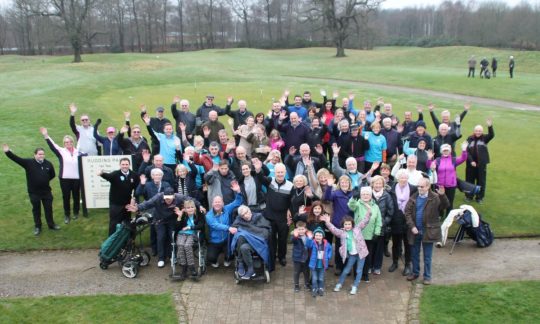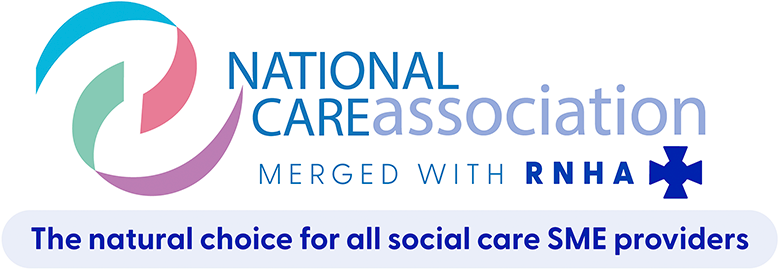21st August 2018
Golf goes head to head with dementia

Dementia is a growing crisis in society. In this special report, we look at Anthony Blackburn, social entrepreneur and the founder of Golf in Society and explain his efforts to make a difference in the lives of people living with dementia and Parkinson’s disease by using the unique attractions of golf.
Every Thursday morning for the last three years, light permitting, Anthony Blackburn has headed out first thing to play nine holes of golf at Lincoln Golf Centre.
Later on that morning he and his team will welcome a bunch of eager recipients to one of his dementia focused golf sessions. After his nine holes, he goes to his car office and prepares another day of development for his social enterprise - Golf in Society. He has approximately two hours, (depending on how he has played his round) to not only make early contact with the ever growing myriad of partners and stakeholders involved in his project but is also mindful of who his attendees are that morning and what he needs to do to make their day special. Lincoln is just one of his centres of excellence.
Moving off the tee
With an impressive care background and equally inspirational approach to people living with dementia and Parkinson’s disease, Anthony has no truck with people who have to live with these conditions being told that their golfing lives are over. He believes that too many golf clubs have turned their backs on members who have spent a lifetime supporting them and its an attitude that has to change. He states "Gone are the days of waiting lists for most clubs and if clubs realised their investments in these lapsed members, they would be contributing to the social good for their locality".
Anthony even has many examples of clients who had never hit a golf ball before. Put simply, we golfers are all aware of those precious moments when we are playing golf, that we fool ourselves into thinking we know exactly what we are doing with body, club and ball and it feels great but we also know it won't last too long. He decided that by using golf, he was going to help people feel that moment when perhaps they had forgotten it was possible ever to do so again.
As a carer, he has always looked for ways of providing mental and physical stimulation to make his clients' days better and whilst he still uses golf to unwind for himself, (we all do don't we?) he realised that there was absolutely no reason why people with so called limited cognitive skills couldn't be helped to maintain them or, who knows, get them back? It wasn't exactly a light bulb moment but certainly it was akin to finding not one but maybe two brand new ProV1's nestling together in the rough. We all know what that means. A quick look round for errant tee shots and they're in the bag.
Food for thought.
There are seven stages to dementia. Why do you, the reader, need to know this?
Here are some surlyn proof facts for you. Current statistics are that there are 850,000 people living with dementia in the UK. In addition, it is estimated by the Alzheimer's Society that 45% of people who are likely to have the condition, haven't been diagnosed yet. For reasons of guilt, denial, ignorance and other circumstances.
There are no grey areas with dementia. If it is part of your life either as somebody living with it, or as a carer, it dominates every aspect of your daily living. The chances are that if you haven't come across the condition on a personal or professional level, you have no idea what that entails.
Such is the emotional turmoil the condition engenders, there are many health experts calling for national minimum wages for family member carers. This might have something to do with the estimation that it costs the government £1.2 billion in lost taxes and making social care payments to people who are cheaper than the NHS and care homes, but it seems some greens are difficult to read easily.
But just to get back to the figures momentarily, imagine that for every one of those 850,000 people in the UK living with dementia, there are at least another six people (family members and professionals) involved in their care programmes either directly or indirectly. Add in the undiagnosed, and you have at least nine million people in the UK trying to get on the first tee. With 15% of our population dedicated to dealing with dementia, it's a fair assumption that a similar percentage are members of golf clubs, or used to be. Given the age profiles for a lot of clubs, the chances are that they are higher. There is a growing body of clinical evidence that shows that the early longer gestation periods of dementia (stages one to four) can be increased by good diet, a level of regular exercise and plenty of mental stimulation. Golf and Health's outstanding installations at this year's Open Championship at Carnoustie is a green light as to how the medical industry is beginning to approach the situation for our elder citizens.
There is unlikely to be a clinical cure for dementia for at least two decades. That's going to be too late for the people needing help now and for some time to come.
Whilst cancer research receives ten times the investment versus finding the answer for curing dementia and Parkinson’s (and all power to its elbow for their extraordinary success rate in treatments), it is likely that we are on our own in dealing with the day to day lifestyles we have to adopt for our family members.
Who's listening?
But it's not just the medical industry that buys into what Golf in Society is doing. Over the last two years, Anthony has developed working relationships with the European Tour, England Golf, Rudding Park GC, Lincoln Golf Centre, Mearns Castle Golf Academy near Glasgow, the Golf & Health project, Life Changes Trust, UnLtd, Howard Swann at Golf Business International and the Alzheimer's Society. All these organisations recognise the opportunities that exist to make lives better for people living with dementia and Parkinson’s and also that there are business benefits to be had for all if the fourteen clubs in the bag are clean and ready for use.
There is another analogy to make here. The putter and the carer. Officially, your putter should be taking care of about 40% of the shots in your round. If you are living with dementia, you depend on your carer totally. The carer, very often a family member, is the one club in your bag that you can't do without, day or night. But when Anthony runs his sessions, he supplies a new putter that enables the weary putter some time to recuperate and recharge the batteries for the inevitable crazy putting course later on in the day.
In an encouraging development recently, our new Secretary of State for Health and Social Care, Matt Holland, has pledged £4.5 million to the concept of social prescribing by general practitioners. This idea has been around for a number of years now, and GP's recognise the benefits of using social prescribing in dealing with their workload and helping their patients. The media announced the news with main headlines of people getting involved in gardening and cookery courses to help avoid being prescribed drugs to alleviate their symptoms and in general just using common sense to "feeling better". Many of these sorts of courses take time (and money) to set up but with golf and the available facilities all over the UK, all you have to do is just pitch up and hit the ball.
Feedback and the future
Anthony sees golf as a perfect addition to these various activities and is passionate about the effects he sees day in day out with his Golf in Society "Golf Days Out" sessions. Here are just a few examples of the sort of feedback he receives: "I can't get him to a day centre, but I can't stop him coming here", "He's happier and he's more relaxed so I'm more relaxed, it's priceless from my point of view to see him happy and doing something because he was always so active" and "They help each other on the golf course so you have this chap with dementia helping another chap with dementia..... they know how each other feels". A further comment really hit home to Anthony recently from Alan at Lincoln Golf Centre.... "I remember now why I enjoy golf so much". Obviously it was nothing to do with the fact that he had just won the monthly Texas Scramble competition. Pure joy from Alan. Strike a chord with anybody?
Danny Walsh, Senior Lecturer (Mental Health Nursing) at the University of Lincoln chips in with his views "This is a marvellous initiative, which is likely to make a significant and very positive impact upon the lives of those people living with dementia and their carers who take part in it. The University is proud to be evaluating this venture from an academic and medical point of view, but I have seen the pleasure and grins on the faces of the participants and that's about as good an evaluation as you can get".
Anthony's plans are ambitious and like the good caddies out there who know their charges well, they are infectious to those around him. He is currently applying through the relevant government departments to start a trial of local GP's near his assigned centres of excellence to encourage social prescribing. Training programmes are being prepared for clubs to not only be dementia friendly but run his courses on a regular basis for lapsed members or any local residents who fancy some easy cost effective respite. A policy of adult safeguarding is being prepared to help clubs instigate his programmes and he is well aware of the potential financial implications for clubs that adopt Golf in Society policies. The blueprint that can be created to facilitate a network of "age-friendly" golf clubs throughout the UK already exists and surely it's just a matter of time before we see his concept at clubs everywhere.
A bit like defibrillators possibly?
The importance of holing out well
Throughout his caring career, Anthony has always believed in the old notion of treating people as you would expect to be. His team are reminded regularly to treat their clients as if they were helping their own fathers or grandfathers and he believes it's an approach that pays off in all his sessions.
As he states, " I see golf leading the way in person-centred sports coaching for people living with dementia and Parkinson’s and from what I have experienced in the growth of the concept, it's the utter joy of not only the participants but also their carers, many of whom rely on our sessions to keep them sane". This is not an understatement.
The cathartic nature of getting involved in the fearful world of dementia is demonstrated by the thousands of people worldwide who have had personal experience of it and are now leaders all over the world in social care with their research and knowledge on the subject and are keen to make sure their stories are told to help others. Mr Blackburn senior was a great judge of pace and direction when it came to his putting and Anthony uses his Dad's putter all the time because he knows it gives him inspiration in the dark arts of the wand. It's no accident that he is a very good putter. A fact about which he is extremely proud.
If you, your club or anybody you know needs help or further information about Golf in Society and its mission for the future, visit www.golfinsociety.com . Alternatively, call Anthony on 07491 694938. He's very happy to take your call and if you have to leave a message, it's probably because he has a club in his hand and is chatting to somebody who needs some help. Or he could be reminiscing about his Dad on the practice putting green.
















